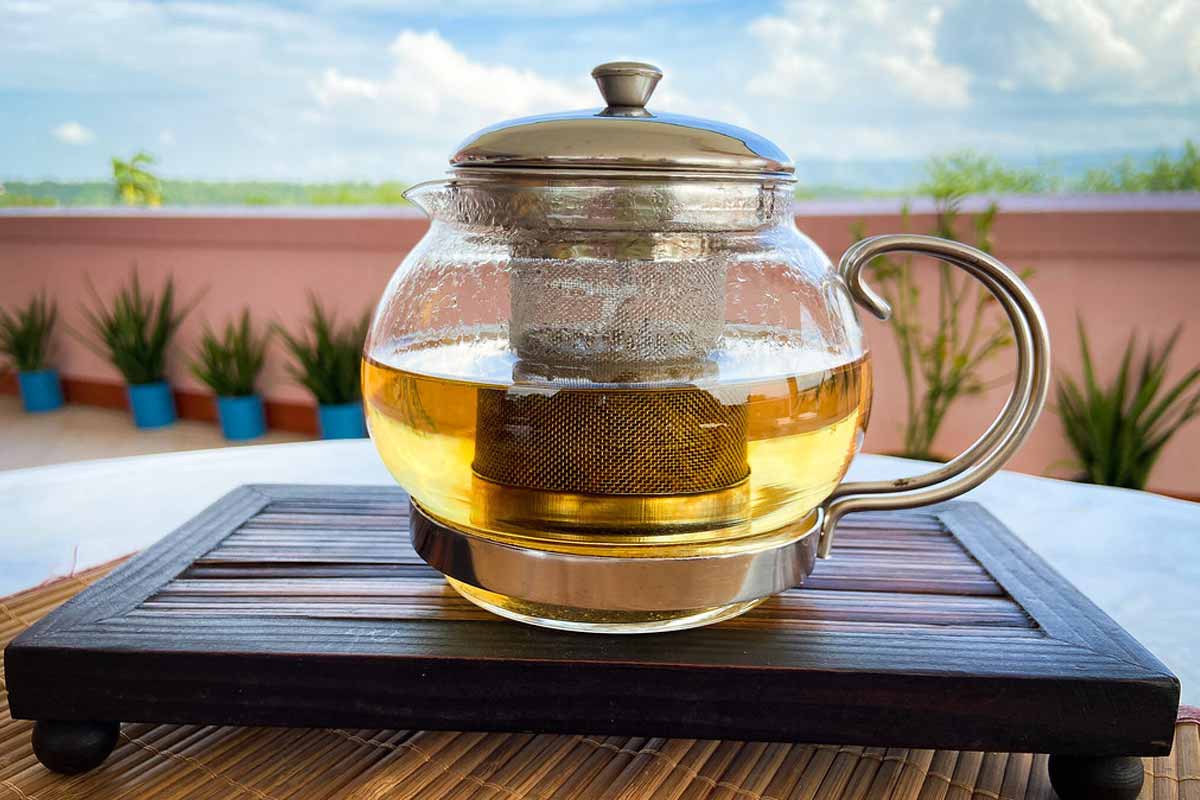What are some of the health benefits of white tea, its nutrition, recipes, & side effects? White tea, often revered for its delicate flavor and subtle aroma, offers a plethora of health benefits that make it a unique and intriguing beverage. Originating from the leaves and buds of the Camellia sinensis plant, white tea stands out as one of the least processed teas, undergoing minimal oxidation. This minimal processing not only preserves its natural flavors but also retains a remarkable range of antioxidants and bioactive compounds, setting it apart from its more heavily processed counterparts. In this article, we will share some of the health benefits of white tea, its nutrition, recipes, & side effects. Keep reading.
White tea stands as a remarkable testament to the potential health benefits found in nature. Its delicate flavor and exceptional antioxidant content make it a captivating choice for those seeking to enhance their well-being. Whether you savor it for its cardiovascular support, skin-nourishing properties, or simply as a comforting cup of antioxidants, white tea offers a multifaceted approach to health that has been treasured for centuries. Embracing the ancient wisdom encapsulated in a cup of white tea may indeed be a delightful and healthful journey worth embarking upon.
Nutritional Facts of White Tea
White tea, renowned for its delicate flavor and numerous health benefits, offers a fascinating array of nutritional components that contribute to its allure. This exquisite tea variety is distinguished by its minimal processing, which preserves a unique combination of vitamins, minerals, antioxidants, and other bioactive compounds. In this exploration, we delve into the intricate nutritional profile of white tea, uncovering the secrets that lie within its pale, unassuming leaves.
1. Antioxidant Richness
One of the most remarkable aspects of white tea is its exceptional antioxidant content. These antioxidants, including catechins, theaflavins, and epigallocatechin gallate (EGCG), play a pivotal role in neutralizing harmful free radicals in the body. The potent antioxidant properties of white tea are believed to aid in reducing oxidative stress, which is associated with various chronic diseases, aging, and overall health deterioration.
2. Low Caloric Content
For those mindful of calorie intake, white tea stands out as an appealing choice. It is virtually calorie-free, making it an ideal beverage for those seeking a refreshing, guilt-free option. This attribute not only promotes weight management but also underscores the tea’s suitability for individuals on calorie-restricted diets.
3. A Source of Essential Minerals
White tea offers a modest yet valuable supply of essential minerals, such as fluoride, manganese, and potassium. Fluoride, in particular, promotes dental health by strengthening tooth enamel, while manganese contributes to various metabolic processes in the body. Potassium, an electrolyte, plays a crucial role in maintaining proper muscle and nerve function, emphasizing white tea’s potential as a hydrating and healthful choice.
4. Mild Caffeine Content
White tea contains a gentle dose of caffeine, significantly less than its black or green counterparts. This makes it a perfect option for those who desire a subtle energy boost without the jittery side effects often associated with higher caffeine levels. The moderate caffeine content in white tea can enhance alertness and focus without causing undue stimulation.
5. Nutrient Preservation through Minimal Processing
The distinctive nature of white tea lies in its minimal processing, which allows it to retain a higher concentration of nutrients compared to more heavily processed teas. While green and black teas undergo oxidation and fermentation processes, white tea’s leaves are typically picked at a very early stage and dried naturally, preserving the delicate flavors and nutritional integrity. Tea, Coffee, Energy Drinks, Juice, Beverage, Smoothie, and more
6. Potential Health Benefits
Beyond its nutritional content, white tea has garnered attention for its potential health benefits. Research suggests that it may have anti-inflammatory, anti-cancer, and cardiovascular protective properties. Its ability to support healthy skin, aid in weight management, and promote overall well-being further adds to its appeal.
In summary, white tea’s nutritional profile is a captivating blend of antioxidants, low calories, essential minerals, mild caffeine, and a commitment to minimal processing. This combination not only makes it a flavorful and refreshing beverage but also positions it as a potential ally in promoting health and vitality. Embracing the world of white tea unveils a treasure trove of nutrients that can delight the senses and nurture the body in a single, soothing cup.
Health Benefits of White Tea
White tea’s spectrum of benefits transcends mere refreshment, touching upon vital aspects of health and well-being. From fortifying cardiovascular health to aiding in diabetes management, enhancing focus, and even promoting hair health and weight loss, this unassuming brew proves itself as a holistic elixir deserving of a place in your daily routine. Here are some of the health benefits of black tea:
1. Heal Atherosclerosis
White tea, a beverage steeped in tradition and renowned for its delicate flavor, offers a surprising array of health benefits. One of its notable advantages lies in its potential to combat atherosclerosis, a condition characterized by the buildup of plaque in arteries. Rich in antioxidants like catechins and polyphenols, white tea possesses the unique ability to counteract oxidative stress, which is a key contributor to arterial plaque formation. By doing so, it can aid in preventing or even healing atherosclerosis, promoting cardiovascular health and reducing the risk of heart disease.
2. Improve Gut Health
Delving deeper into its health-promoting properties, white tea emerges as a potential ally for your gut. Within its leaves lies a reservoir of natural compounds, such as tannins, which possess prebiotic properties. These compounds can nourish the beneficial bacteria residing in your gut, fostering a balanced and harmonious microbial environment. A healthier gut not only aids in digestion but also bolsters your overall immune system, making white tea a subtle yet valuable addition to your wellness routine.
3. Lower Bad LDL Cholesterol
When it comes to cholesterol management, white tea proves to be a gentle yet effective elixir. Research has shown that the antioxidants in white tea can help lower levels of low-density lipoprotein (LDL) cholesterol, often referred to as the “bad” cholesterol. By mitigating LDL cholesterol, white tea contributes to the maintenance of a healthy lipid profile, reducing the risk of plaque formation in arteries and safeguarding against cardiovascular ailments.
4. Cognitive Function: Nourishing the Intellect
Intriguingly, white tea’s influence isn’t confined to the realm of the body; it extends its benevolence to the mind. Studies, like whispers from academia, suggest that the compounds found in white tea possess the power to awaken your cognitive faculties. Alertness takes root, concentration deepens, and the memory becomes a more reliable companion. While it may not be the philosopher’s stone of brain health, white tea offers a refreshing sip of mental clarity and focus, a tantalizing invitation to explore the uncharted territories of your intellect.
5. Digestive Support: A Tranquil Cup
White tea, with its ethereal and soothing flavor profile, becomes a balm for the digestive system. Across cultures and centuries, it has been the time-tested antidote to digestive discomfort, a soothing potion for moments of gastric unease. The soothing embrace of its anti-inflammatory properties caresses the digestive tract, providing solace after a sumptuous meal or during bouts of abdominal unrest. White tea doesn’t just tantalize the taste buds; it soothes the soul within.
6. Good for Diabetes
White tea, a beverage celebrated for its multifaceted benefits, emerges as a potential ally in the realm of diabetes management. Its remarkable ability to enhance insulin sensitivity takes center stage, offering a promising avenue for individuals seeking to regulate their blood sugar levels. Within white tea, a symphony of polyphenols collaborates harmoniously to optimize glucose metabolism. This intricate interplay of compounds positions white tea as a beverage with substantial potential for those navigating the challenges of diabetes, either as a proactive measure or as part of a comprehensive management strategy.
7. Antioxidant Richness: A Key to Cellular Health
At the heart of white tea’s extraordinary health benefits resides its rich tapestry of antioxidants. Renowned as a veritable treasure trove of polyphenols, including the revered catechins and flavonoids, white tea emerges as a formidable warrior against the relentless onslaught of oxidative stress. These antioxidants, like vigilant sentinels, diligently intercept and neutralize the malevolent free radicals, thus forming an impenetrable shield around our precious cells and DNA. By doing so, they orchestrate a symphony of cellular protection, significantly lowering the risk of chronic diseases and forestalling the inexorable march of premature aging. It is this intricate choreography of antioxidants within the confines of white tea that bestows upon it an almost mystical aura, elevating it to the status of a health elixir that promises longevity and vitality.
8. Cardiovascular Wellness: Nurturing a Strong Heart
The benevolent influence of white tea extends its reach to the realm of cardiovascular health, a vital cornerstone of overall well-being. Meticulous research has unveiled the potential of regular white tea consumption to act as a custodian of our cardiovascular system. It appears that white tea may wield the power to maintain blood pressure at optimal levels while concurrently reducing the presence of the notorious villain, bad cholesterol, within our bloodstream. These dual effects, akin to a soothing balm for the heart, cast a protective shield that mitigates the risks of debilitating heart diseases. As such, white tea beckons to those who hold the sanctity of their cardiovascular well-being in the highest regard, offering a tantalizing sip towards a heart that beats strong and resilient.
9. Good for Hair: Nourishing Your Tresses
Beyond its remarkable internal health benefits, white tea unfurls its magic in the realm of hair care, offering a holistic approach to wellness. Delicate and exquisite, white tea extracts are gaining prominence as star ingredients in hair products. Their allure lies in their potent antioxidant properties, a guardian against the forces of hair’s nemesis – free radicals. These malevolent entities, if left unchecked, can wreak havoc by damaging hair follicles, potentially culminating in the dreaded hair loss and premature graying. By seamlessly integrating white tea into your hair care ritual, you embark on a journey to bestow upon your locks not just resilience but a radiant vibrancy that only nature’s elixirs can provide.
10. Good for Weight Loss: A Companion on the Journey
In the pursuit of a leaner, healthier you, white tea emerges as an unexpected yet welcome ally. Its metabolic-boosting prowess and the ability to stoke the fires of fat oxidation have captivated the attention of scientific minds. Sipping on a cup of white tea prior to your exercise regimen might just be the secret weapon you’ve been seeking. It empowers your body to become a formidable fat-burning furnace, an invaluable aid in your weight loss odyssey. And what’s more, its ethereal calorie count ensures that you can indulge guilt-free, even when meticulously counting every calorie.
11. Weight Management: The Natural Support
For those embarking on the labyrinthine journey of weight management, white tea emerges as a gentle yet potent support system. Scientific inquiry has postulated that white tea possesses the ability to orchestrate the metabolism of fats, choreographing the intricate dance of fat breakdown and utilization within the body. While it may not be the fabled elixir of instant weight loss, white tea’s mild stimulant attributes and potential to foster a harmonious metabolism render it an invaluable component of a balanced diet and an active lifestyle. It’s the silent partner in your quest for a healthier, more vibrant you.
12. Skin Health: Unveiling Radiance
The far-reaching benefits of white tea extend their embrace to your external visage, nurturing beauty from within. The resplendent armor of its antioxidant arsenal stands guard, a sentinel against the relentless march of time on your skin. UV radiation, that malevolent despoiler of youthful allure, is held at bay. Fine lines and wrinkles, the markers of wisdom earned through the years, are softened and subdued. Your skin, once ravaged by the elements, finds solace in the protective aura of white tea. Not to be underestimated are its anti-inflammatory attributes, providing respite for those navigating the capricious terrain of skin conditions. White tea isn’t just a beverage; it’s a ritual of self-care.
13. Increase Focus
In the tumultuous landscape of our modern lives, characterized by ceaseless distractions and a perpetual race against time, the quest for unwavering focus and mental clarity often feels elusive. Here, white tea emerges as an unassuming yet potent ally. With a modest infusion of caffeine, it gently fans the embers of cognitive acuity. However, what sets white tea apart is its secret weapon: L-theanine, a rare amino acid nestled within tea leaves.
This dynamic duo orchestrates a symphony of alertness without the jarring tremors and palpitations associated with more robust caffeine sources. Sipping on a cup of white tea, one can expect not a torrent but a gentle, persistent stream of mental clarity, a subtle enhancement of concentration, and a profound boost to productivity. It’s a discreet mental edge, a whisper in a cacophonous world, beckoning one to embrace the serenity of focused thought.

Optimal White Tea Consumption: How Much and When?
White tea, renowned for its delicate flavor and potential health benefits, presents an intriguing question: how much should one consume, and when is the best time to enjoy it? Delving into this matter requires a nuanced understanding of white tea’s characteristics and the individual’s preferences and health considerations.
Quantity Matters: How Much White Tea to Consume Daily
The quantity of white tea one should drink daily hinges on various factors, including personal preferences, tolerance to caffeine, and health objectives. On average, most experts suggest a daily consumption of one to three cups of white tea. This moderate intake provides a balance between enjoying its flavor and reaping potential health advantages.
However, it’s important to note that white tea contains less caffeine than black or green tea, making it a milder choice. This lower caffeine content permits some individuals to indulge in more cups without experiencing the jitters associated with higher caffeine intake.
Moreover, if you’re specifically seeking white tea for its potential health benefits, such as antioxidant properties and its role in promoting skin health and aiding weight management, a daily regimen of two to three cups may be more advantageous. The antioxidants in white tea can aid in combating free radicals and supporting overall well-being.
Timing is Key: When to Savor White Tea
The timing of white tea consumption can greatly influence your experience and potential benefits. Here are some considerations for when to enjoy this exquisite beverage:
Morning Elixir: White tea’s subtle caffeine content makes it a suitable choice for the morning, providing a gentle wake-up call without the intensity of a coffee jolt. Its refreshing, slightly sweet flavor can be a delightful way to start your day.
Afternoon Respite: White tea’s calming properties and lower caffeine levels also make it an excellent choice for the afternoon. It can help you unwind, stay focused, and combat the afternoon slump.
Evening Serenity: For those who are sensitive to caffeine or prefer to avoid it in the evening, opting for caffeine-free herbal teas or decaffeinated white tea is a wise choice. These options allow you to enjoy the soothing qualities of white tea without interfering with your sleep patterns.
Mealtime Complement: White tea’s delicate taste pairs harmoniously with various foods. Consider sipping it alongside light meals, salads, or seafood to enhance the dining experience.
Stress Relief: If you seek relaxation and stress relief, white tea’s combination of flavor and soothing properties makes it a perfect choice during moments of tranquility or meditation.
In essence, the timing of your white tea consumption should align with your individual preferences, daily routine, and caffeine tolerance. Whether you choose to savor it in the morning to kickstart your day or as an afternoon interlude, white tea offers a versatile and healthful addition to your daily beverage choices.
Delicious White Tea Recipes: A Culinary Journey
White tea, celebrated for its delicate flavors and subtle fragrance, offers a unique and enticing canvas for culinary experimentation. Whether you’re a seasoned tea connoisseur or an aspiring gastronome, these white tea recipes promise to elevate your dining experience. In this exploration, we’ll delve into the description, ingredients, proportions, and steps for creating three exquisite white tea-infused dishes. Prepare to embark on a culinary adventure that celebrates the elegance of white tea in a variety of delectable forms.
1. White Tea-Infused Poached Pears (A Symphony of Flavors)
Picture this – ripe, succulent pears gently poached in a fragrant bath of white tea, honey, and aromatic spices. The result is a dessert that harmonizes the floral notes of white tea with the natural sweetness of pears. It’s a sensory journey that transcends taste, creating a captivating aroma that fills your kitchen.
Ingredients
To embark on this culinary journey, you’ll need:
4 ripe pears (Bartlett or Bosc)
2 cups of brewed white tea (Silver Needle or Bai Mu Dan)
1/2 cup of honey
1 cinnamon stick
2 cloves
A few strips of lemon zest
Proportions
The delicate balance between white tea, honey, and spices is crucial. Aim for a tea-to-liquid ratio of 1:2, ensuring that the tea’s nuances shine through without overwhelming the pears’ natural flavor.
Steps
Begin by brewing a robust cup of white tea, allowing it to steep until it reaches a mild golden hue. In a saucepan, combine the brewed tea, honey, cinnamon stick, cloves, and lemon zest. Bring this enchanting concoction to a gentle simmer. While the tea simmers, peel and core the pears, ensuring they remain whole. Carefully place the pears into the simmering liquid, allowing them to bathe in the aromatic infusion for 20-25 minutes, or until tender but not mushy. Remove the pears, let them cool slightly, and serve them drizzled with the luscious poaching liquid. Garnish with a sprig of fresh mint for an elegant finish.
2. White Tea and Citrus-Glazed Salmon (A Gourmet Extravaganza)
The marriage of white tea and salmon creates a symphony of flavors that tantalize the palate. Imagine succulent salmon fillets bathed in a citrus-infused white tea glaze, offering a perfect balance of savory and zesty notes. This gourmet dish will undoubtedly leave a lasting impression.
Ingredients
To embark on this culinary masterpiece, gather the following:
4 salmon fillets
1 cup of brewed white tea (try Jasmine Silver Needle for a floral touch)
1/4 cup of fresh orange juice
Zest of one lemon
2 tablespoons of honey
2 cloves of garlic, minced
Salt and pepper to taste
Proportions
Achieve the perfect harmony of flavors by maintaining a tea-to-liquid ratio of 1:4 in your glaze. This ensures that the white tea’s subtle nuances gracefully enhance the salmon’s taste.
Steps
Begin by brewing a cup of white tea and letting it cool. In a mixing bowl, combine the brewed tea, fresh orange juice, lemon zest, honey, minced garlic, salt, and pepper. Whisk this delightful concoction until it forms a smooth glaze. Brush the salmon fillets generously with the glaze and let them marinate for at least 30 minutes. Preheat your grill or oven to medium-high heat. Grill or roast the salmon until it flakes easily with a fork, periodically basting with the remaining glaze for an exquisite finish.
3. White Tea and Lavender Infused Ice Cream (A Chilled Indulgence)
Savor the serenity of white tea and the floral elegance of lavender in this creamy ice cream creation. Imagine a velvety, frozen dessert that captures the essence of a tranquil tea garden on a warm summer’s day. This indulgence is a sublime marriage of creaminess and botanical charm.
Ingredients
To craft this luscious treat, gather these ingredients:
2 cups of heavy cream
1 cup of whole milk
1/2 cup of sugar
2 tablespoons of white tea leaves (e.g., Silver Needle)
1 tablespoon of dried culinary lavender buds
6 large egg yolks
Proportions
Achieve the perfect balance by steeping 2 tablespoons of white tea leaves and 1 tablespoon of lavender buds in the milk and cream mixture. This proportion infuses the ice cream with a delicate, yet distinct, tea and floral essence.
Steps
Begin by heating the heavy cream and whole milk in a saucepan over medium heat until it simmers. Remove it from the heat, add the white tea leaves and dried lavender buds, and cover. Let the mixture steep for about 15-20 minutes to infuse the flavors. In a separate bowl, whisk the egg yolks and sugar until pale and creamy. Strain the infused milk and cream mixture into the egg yolk mixture, discarding the tea leaves and lavender buds. Return the combined mixture to the saucepan and heat gently until it thickens into a custard-like consistency. Allow it to cool, then transfer it to an ice cream maker and churn according to the manufacturer’s instructions. Once churned, transfer the ice cream to an airtight container and freeze for several hours until it’s firm and ready to be savored.
In summary, these white tea recipes offer a delightful fusion of flavors, showcasing the versatility of white tea beyond your teacup. Whether you opt for the delicate poached pears, the gourmet glazed salmon, or the chilled lavender-infused ice cream, each dish promises a culinary journey that celebrates the elegance and complexity of white tea in the world of gastronomy.
The Potential Side Effects of White Tea Consumption
White tea, celebrated for its delicate flavor and purported health benefits, is often hailed as a natural elixir. However, it’s essential to explore the nuanced aspects of its consumption, including potential side effects, to make an informed decision about its inclusion in your diet. Tea, Coffee, Energy Drinks, Juice, Beverage, Smoothie, and more
Delicate yet Deceptive
White tea, derived from the Camellia sinensis plant, is celebrated for its subtlety and light flavor profile. Its leaves are minimally processed, allowing them to retain their natural antioxidants, such as catechins. While these antioxidants are often lauded for their potential health benefits, they can have side effects when consumed in excess.
Caffeine Content
One notable aspect of white tea is its caffeine content. While it contains less caffeine than black or green tea, it is not entirely caffeine-free. Excessive consumption of caffeine can lead to side effects such as jitteriness, insomnia, increased heart rate, and digestive disturbances. Therefore, individuals sensitive to caffeine should exercise caution when indulging in copious amounts of white tea.
Interactions with Medications
White tea’s bioactive compounds can interact with certain medications. For example, its high content of tannins may interfere with the absorption of non-heme iron from plant-based foods, potentially affecting individuals with iron-deficiency anemia. Additionally, it may interact with blood thinners and impact their effectiveness. It is advisable for individuals on medication to consult their healthcare provider before incorporating white tea into their daily routine.
Potential for Dental Health Concerns
While white tea is often perceived as gentle on teeth, it is not entirely exempt from causing dental concerns. Its natural acidity can contribute to tooth enamel erosion if consumed excessively. Proper dental hygiene and moderation in tea consumption can mitigate this potential issue.
Allergic Reactions
Allergies to white tea are relatively rare but not unheard of. Some individuals may experience allergic reactions to compounds in white tea, leading to symptoms such as skin rashes, itching, or digestive discomfort. If you suspect an allergy to white tea, it’s advisable to discontinue its consumption and seek medical advice.
Quality and Purity Matters
The quality and purity of white tea products can vary significantly. Contaminants or additives present in low-quality white tea can lead to adverse reactions. To minimize the risk of side effects, it’s crucial to source high-quality white tea from reputable sources.
Final thought: Sipping the Elixir of Health
While white tea offers numerous potential health benefits and is generally considered safe for most people when consumed in moderation, it’s essential to be aware of its potential side effects and interactions. As with any dietary choice, balance and informed decision-making are key. Consulting a healthcare professional when in doubt can provide personalized guidance on incorporating white tea into your lifestyle while minimizing the risk of adverse effects.



